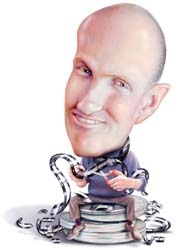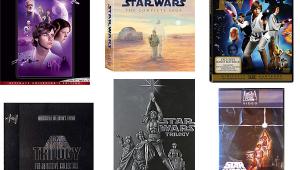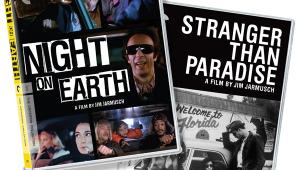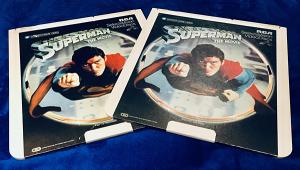Making the Cut

To address concerns over violence, sex, and profanity in popular films, a number of companies have emerged that create "sanitized" versions of VHS tapes or DVDs for a fee. For instance, CleanFlicks, a Utah-based video store chain, sells altered versions of movies, while Trilogy Studios, also in Utah, offers a Windows program called MovieMask.  Warren Adler, Associate National Executive Director of the Directors Guild of America, and Breck Rice, Founder and COO of Trilogy Studios, maker of Movie Mask. (Illustrations by Turnstyle Imaging) MovieMask executes on-the-fly cuts to eliminate content that Trilogy suspects viewers will find offensive. The edit decisions are made by company employees without the participation or approval of the movie's creators. Viewers choose degrees of sex, violence, and profanity from Children, Teen, Young Adult, and Adult categories. For an $80-per-year subscription, you can download the software from www.moviemask.com or buy it at a computer store. Last year, CleanFlicks initiated a preemptive lawsuit against 16 prominent movie directors over its right to rent censored movies. The Directors Guild of America (DGA) countersued for trademark dilution and unfair competition, naming CleanFlicks, Trilogy, and seven other companies. In separate interviews, I talked with Trilogy founder Breck Rice and Warren Adler of the DGA to get a sense of where they stand on the divisive issue of "personalized" movie censorship. Would it be accurate to say that Hollywood finds MovieMask controversial primarily because you use a board of censors to create a version of a movie without the creator's input? Rice: Yeah. That would probably be an accurate statement-which is the very reason we attempted to work with the industry so that their input would be heard and facilitated through our process. Do you differentiate between software that can be adjusted to skip over parts of a movie and companies that cut a movie so it can no longer be viewed in its original form? Adler: The technology is different, but the essence is the same. These companies are changing the authorized version of the film and selling it to the consumer. Whether that's done by actually selling a cassette that's been edited or by selling someone software that allows them to press a button and see the version that MovieMask has edited, it's the same thing. Rice: The Directors Guild has now involved virtually every company on the planet that has done anything to give consumers choice or provide a service for editing movies. Companies that create DVD-Rs of an edited movie are making a permanent change. Our approach is a real-time solution based on what consumers have chosen to omit from the movie. It's done during playback. Take the movie out of the player, and it's still the original movie. Who makes the edit decisions for MovieMask? Rice: They're made by several individuals based on guidelines that are in turn based on the Motion Picture Association of America (MPAA), TV, and Internet rating systems, and also on reports from psychologists and sociologists concerning what is appropriate for different age groups. So it could be argued that scrutinizing our rating system is no different from scrutinizing anybody else's. How many users do you have? Rice: A little over 2,000 people have registered their copies of the software, and who knows how many are using the 30-day free trial? But we do have preorders for 10,000 units that we'll be offering as a software package through retail stores. Some would argue that altering a movie is a bad idea whether it's done by the government, the church, a family organization, or private enterprise. Rice: It doesn't matter if consumers get to choose for themselves. If we were a company making the decision for you-saying that you couldn't watch the original R-rated version and could only watch it one way, that would be going a little too far. But to simply give you tools so you can tone down the language or violence while leaving everything else intact is reasonable. Adler: It's important to draw distinctions between the capability of the consumer to take a DVD or cassette and modify it to suit his or her own tastes and a company taking an existing movie, modifying it, and then reselling it. Those are two very different things. The former may be inevitable and desirable, but the second is neither. Is altering a movie a form of censorship? Adler: This isn't about censorship. This is about taking somebody else's creation and making money by changing it and selling the changed version. Rice: It's actually about consumer choice. If you were to sanitize a movie and only give that version to consumers, that could be viewed as getting on a soapbox. But our system allows consumers to choose for themselves where their comfort level lies. Why is it that people don't seem too upset about having movies altered but there's always an outcry when organizations censor books or paintings? Adler: The Directors Guild is committed to raising awareness of the importance of movies as something that should be respected to the same degree as books and paintings. Rice: I'm not sure the same copyright law applies for use in the privacy of your own home. Once you've paid for that book, it's your property to do what you want with it. But aren't the DGA and Hollywood contending that MovieMask and CleanFlicks, by making edit decisions, are violating the copyright before the version makes it into the home? Rice: Yeah. It will be interesting to see what the outcome is, because people certainly hold strong opinions on both sides of the issue. We believe this is something the consumer should be given the right to do. What's the difference between giving you a remote control with fast forward and mute, and a system like ours that automates those things for you? There are plenty of B movies filled with gratuitous violence, but why watch an A movie like A Clockwork Orange if you take out the violence? Aren't you in effect robbing people of the movie's meaning? Adler: That's right. But ultimately the lawsuits aren't about which movies are art-about which ones deserve to be preserved and which ones don't. This is about the fact that if somebody makes a movie and spends tens of millions of dollars and years of their lives, the law entitles them to control it for a period of time. That's what we're trying to protect. Rice: We fully support that opinion, and that's why every movie in our player can still be watched as originally intended. It's all about consumer choice with us. But why would someone pay $80 for a player to watch the original version when he can use the free player software that comes with the computer? Rice: Right. Well, it's entirely about choice, and one of the choices we haven't taken away from consumers is to watch the original version. With MovieMask, you can watch the original without having to switch between the free player and the player you paid for that gives you additional choices. Would you agree that the vast majority of people are using your player to watch altered versions of movies? Rice: For Version 1.0, yes. But future versions will offer more content, more interactive capabilities, and I believe that's a much larger market than the one that just wants to have rating reductions. How is a version of a movie edited by a program like MovieMask different from a version edited for showing on an airplane? Adler: The major difference is that the editing wasn't done by the people responsible for making the movie. And some movies aren't intended to be edited. The process of editing isn't something that is routine or without creative choices. One of DVD's big selling points was that it could offer alternative versions of a movie. Not using this feature would seem to have opened the door for companies like MovieMask. For instance, why don't studios offer the airline version on DVD? Adler: It's really a question to ask the studios. Maybe at some point they'll do that. Given that CleanFlicks and MovieMask are based in Utah, and given the orientation of their products, is it fair to assume that both companies arose primarily to address the concerns of Mormons and other conservative communities? Adler: That's not really true at least in respect to MovieMask. They've made very clear that they have every anticipation of making all kinds of changes to movies that have nothing to do with the family market. They've demonstrated Star Wars lightsabers [substituted for swords] in The Princess Bride, product placements, and so on. This isn't just about the "family friendly" versions. And this isn't just about Utah. CleanFlicks now says they have something like 85 stores in a number of states. Rice: That certainly would be the easy way to explain away the need for this, that it's one group. We didn't even survey Utah or the Bible Belt for our initial market research, and still the numbers came back supporting the idea that families are interested in a service like this that has nothing to do with religious preferences.
Warren Adler, Associate National Executive Director of the Directors Guild of America, and Breck Rice, Founder and COO of Trilogy Studios, maker of Movie Mask. (Illustrations by Turnstyle Imaging) MovieMask executes on-the-fly cuts to eliminate content that Trilogy suspects viewers will find offensive. The edit decisions are made by company employees without the participation or approval of the movie's creators. Viewers choose degrees of sex, violence, and profanity from Children, Teen, Young Adult, and Adult categories. For an $80-per-year subscription, you can download the software from www.moviemask.com or buy it at a computer store. Last year, CleanFlicks initiated a preemptive lawsuit against 16 prominent movie directors over its right to rent censored movies. The Directors Guild of America (DGA) countersued for trademark dilution and unfair competition, naming CleanFlicks, Trilogy, and seven other companies. In separate interviews, I talked with Trilogy founder Breck Rice and Warren Adler of the DGA to get a sense of where they stand on the divisive issue of "personalized" movie censorship. Would it be accurate to say that Hollywood finds MovieMask controversial primarily because you use a board of censors to create a version of a movie without the creator's input? Rice: Yeah. That would probably be an accurate statement-which is the very reason we attempted to work with the industry so that their input would be heard and facilitated through our process. Do you differentiate between software that can be adjusted to skip over parts of a movie and companies that cut a movie so it can no longer be viewed in its original form? Adler: The technology is different, but the essence is the same. These companies are changing the authorized version of the film and selling it to the consumer. Whether that's done by actually selling a cassette that's been edited or by selling someone software that allows them to press a button and see the version that MovieMask has edited, it's the same thing. Rice: The Directors Guild has now involved virtually every company on the planet that has done anything to give consumers choice or provide a service for editing movies. Companies that create DVD-Rs of an edited movie are making a permanent change. Our approach is a real-time solution based on what consumers have chosen to omit from the movie. It's done during playback. Take the movie out of the player, and it's still the original movie. Who makes the edit decisions for MovieMask? Rice: They're made by several individuals based on guidelines that are in turn based on the Motion Picture Association of America (MPAA), TV, and Internet rating systems, and also on reports from psychologists and sociologists concerning what is appropriate for different age groups. So it could be argued that scrutinizing our rating system is no different from scrutinizing anybody else's. How many users do you have? Rice: A little over 2,000 people have registered their copies of the software, and who knows how many are using the 30-day free trial? But we do have preorders for 10,000 units that we'll be offering as a software package through retail stores. Some would argue that altering a movie is a bad idea whether it's done by the government, the church, a family organization, or private enterprise. Rice: It doesn't matter if consumers get to choose for themselves. If we were a company making the decision for you-saying that you couldn't watch the original R-rated version and could only watch it one way, that would be going a little too far. But to simply give you tools so you can tone down the language or violence while leaving everything else intact is reasonable. Adler: It's important to draw distinctions between the capability of the consumer to take a DVD or cassette and modify it to suit his or her own tastes and a company taking an existing movie, modifying it, and then reselling it. Those are two very different things. The former may be inevitable and desirable, but the second is neither. Is altering a movie a form of censorship? Adler: This isn't about censorship. This is about taking somebody else's creation and making money by changing it and selling the changed version. Rice: It's actually about consumer choice. If you were to sanitize a movie and only give that version to consumers, that could be viewed as getting on a soapbox. But our system allows consumers to choose for themselves where their comfort level lies. Why is it that people don't seem too upset about having movies altered but there's always an outcry when organizations censor books or paintings? Adler: The Directors Guild is committed to raising awareness of the importance of movies as something that should be respected to the same degree as books and paintings. Rice: I'm not sure the same copyright law applies for use in the privacy of your own home. Once you've paid for that book, it's your property to do what you want with it. But aren't the DGA and Hollywood contending that MovieMask and CleanFlicks, by making edit decisions, are violating the copyright before the version makes it into the home? Rice: Yeah. It will be interesting to see what the outcome is, because people certainly hold strong opinions on both sides of the issue. We believe this is something the consumer should be given the right to do. What's the difference between giving you a remote control with fast forward and mute, and a system like ours that automates those things for you? There are plenty of B movies filled with gratuitous violence, but why watch an A movie like A Clockwork Orange if you take out the violence? Aren't you in effect robbing people of the movie's meaning? Adler: That's right. But ultimately the lawsuits aren't about which movies are art-about which ones deserve to be preserved and which ones don't. This is about the fact that if somebody makes a movie and spends tens of millions of dollars and years of their lives, the law entitles them to control it for a period of time. That's what we're trying to protect. Rice: We fully support that opinion, and that's why every movie in our player can still be watched as originally intended. It's all about consumer choice with us. But why would someone pay $80 for a player to watch the original version when he can use the free player software that comes with the computer? Rice: Right. Well, it's entirely about choice, and one of the choices we haven't taken away from consumers is to watch the original version. With MovieMask, you can watch the original without having to switch between the free player and the player you paid for that gives you additional choices. Would you agree that the vast majority of people are using your player to watch altered versions of movies? Rice: For Version 1.0, yes. But future versions will offer more content, more interactive capabilities, and I believe that's a much larger market than the one that just wants to have rating reductions. How is a version of a movie edited by a program like MovieMask different from a version edited for showing on an airplane? Adler: The major difference is that the editing wasn't done by the people responsible for making the movie. And some movies aren't intended to be edited. The process of editing isn't something that is routine or without creative choices. One of DVD's big selling points was that it could offer alternative versions of a movie. Not using this feature would seem to have opened the door for companies like MovieMask. For instance, why don't studios offer the airline version on DVD? Adler: It's really a question to ask the studios. Maybe at some point they'll do that. Given that CleanFlicks and MovieMask are based in Utah, and given the orientation of their products, is it fair to assume that both companies arose primarily to address the concerns of Mormons and other conservative communities? Adler: That's not really true at least in respect to MovieMask. They've made very clear that they have every anticipation of making all kinds of changes to movies that have nothing to do with the family market. They've demonstrated Star Wars lightsabers [substituted for swords] in The Princess Bride, product placements, and so on. This isn't just about the "family friendly" versions. And this isn't just about Utah. CleanFlicks now says they have something like 85 stores in a number of states. Rice: That certainly would be the easy way to explain away the need for this, that it's one group. We didn't even survey Utah or the Bible Belt for our initial market research, and still the numbers came back supporting the idea that families are interested in a service like this that has nothing to do with religious preferences.
 Warren Adler, Associate National Executive Director of the Directors Guild of America, and Breck Rice, Founder and COO of Trilogy Studios, maker of Movie Mask. (Illustrations by Turnstyle Imaging) MovieMask executes on-the-fly cuts to eliminate content that Trilogy suspects viewers will find offensive. The edit decisions are made by company employees without the participation or approval of the movie's creators. Viewers choose degrees of sex, violence, and profanity from Children, Teen, Young Adult, and Adult categories. For an $80-per-year subscription, you can download the software from www.moviemask.com or buy it at a computer store. Last year, CleanFlicks initiated a preemptive lawsuit against 16 prominent movie directors over its right to rent censored movies. The Directors Guild of America (DGA) countersued for trademark dilution and unfair competition, naming CleanFlicks, Trilogy, and seven other companies. In separate interviews, I talked with Trilogy founder Breck Rice and Warren Adler of the DGA to get a sense of where they stand on the divisive issue of "personalized" movie censorship. Would it be accurate to say that Hollywood finds MovieMask controversial primarily because you use a board of censors to create a version of a movie without the creator's input? Rice: Yeah. That would probably be an accurate statement-which is the very reason we attempted to work with the industry so that their input would be heard and facilitated through our process. Do you differentiate between software that can be adjusted to skip over parts of a movie and companies that cut a movie so it can no longer be viewed in its original form? Adler: The technology is different, but the essence is the same. These companies are changing the authorized version of the film and selling it to the consumer. Whether that's done by actually selling a cassette that's been edited or by selling someone software that allows them to press a button and see the version that MovieMask has edited, it's the same thing. Rice: The Directors Guild has now involved virtually every company on the planet that has done anything to give consumers choice or provide a service for editing movies. Companies that create DVD-Rs of an edited movie are making a permanent change. Our approach is a real-time solution based on what consumers have chosen to omit from the movie. It's done during playback. Take the movie out of the player, and it's still the original movie. Who makes the edit decisions for MovieMask? Rice: They're made by several individuals based on guidelines that are in turn based on the Motion Picture Association of America (MPAA), TV, and Internet rating systems, and also on reports from psychologists and sociologists concerning what is appropriate for different age groups. So it could be argued that scrutinizing our rating system is no different from scrutinizing anybody else's. How many users do you have? Rice: A little over 2,000 people have registered their copies of the software, and who knows how many are using the 30-day free trial? But we do have preorders for 10,000 units that we'll be offering as a software package through retail stores. Some would argue that altering a movie is a bad idea whether it's done by the government, the church, a family organization, or private enterprise. Rice: It doesn't matter if consumers get to choose for themselves. If we were a company making the decision for you-saying that you couldn't watch the original R-rated version and could only watch it one way, that would be going a little too far. But to simply give you tools so you can tone down the language or violence while leaving everything else intact is reasonable. Adler: It's important to draw distinctions between the capability of the consumer to take a DVD or cassette and modify it to suit his or her own tastes and a company taking an existing movie, modifying it, and then reselling it. Those are two very different things. The former may be inevitable and desirable, but the second is neither. Is altering a movie a form of censorship? Adler: This isn't about censorship. This is about taking somebody else's creation and making money by changing it and selling the changed version. Rice: It's actually about consumer choice. If you were to sanitize a movie and only give that version to consumers, that could be viewed as getting on a soapbox. But our system allows consumers to choose for themselves where their comfort level lies. Why is it that people don't seem too upset about having movies altered but there's always an outcry when organizations censor books or paintings? Adler: The Directors Guild is committed to raising awareness of the importance of movies as something that should be respected to the same degree as books and paintings. Rice: I'm not sure the same copyright law applies for use in the privacy of your own home. Once you've paid for that book, it's your property to do what you want with it. But aren't the DGA and Hollywood contending that MovieMask and CleanFlicks, by making edit decisions, are violating the copyright before the version makes it into the home? Rice: Yeah. It will be interesting to see what the outcome is, because people certainly hold strong opinions on both sides of the issue. We believe this is something the consumer should be given the right to do. What's the difference between giving you a remote control with fast forward and mute, and a system like ours that automates those things for you? There are plenty of B movies filled with gratuitous violence, but why watch an A movie like A Clockwork Orange if you take out the violence? Aren't you in effect robbing people of the movie's meaning? Adler: That's right. But ultimately the lawsuits aren't about which movies are art-about which ones deserve to be preserved and which ones don't. This is about the fact that if somebody makes a movie and spends tens of millions of dollars and years of their lives, the law entitles them to control it for a period of time. That's what we're trying to protect. Rice: We fully support that opinion, and that's why every movie in our player can still be watched as originally intended. It's all about consumer choice with us. But why would someone pay $80 for a player to watch the original version when he can use the free player software that comes with the computer? Rice: Right. Well, it's entirely about choice, and one of the choices we haven't taken away from consumers is to watch the original version. With MovieMask, you can watch the original without having to switch between the free player and the player you paid for that gives you additional choices. Would you agree that the vast majority of people are using your player to watch altered versions of movies? Rice: For Version 1.0, yes. But future versions will offer more content, more interactive capabilities, and I believe that's a much larger market than the one that just wants to have rating reductions. How is a version of a movie edited by a program like MovieMask different from a version edited for showing on an airplane? Adler: The major difference is that the editing wasn't done by the people responsible for making the movie. And some movies aren't intended to be edited. The process of editing isn't something that is routine or without creative choices. One of DVD's big selling points was that it could offer alternative versions of a movie. Not using this feature would seem to have opened the door for companies like MovieMask. For instance, why don't studios offer the airline version on DVD? Adler: It's really a question to ask the studios. Maybe at some point they'll do that. Given that CleanFlicks and MovieMask are based in Utah, and given the orientation of their products, is it fair to assume that both companies arose primarily to address the concerns of Mormons and other conservative communities? Adler: That's not really true at least in respect to MovieMask. They've made very clear that they have every anticipation of making all kinds of changes to movies that have nothing to do with the family market. They've demonstrated Star Wars lightsabers [substituted for swords] in The Princess Bride, product placements, and so on. This isn't just about the "family friendly" versions. And this isn't just about Utah. CleanFlicks now says they have something like 85 stores in a number of states. Rice: That certainly would be the easy way to explain away the need for this, that it's one group. We didn't even survey Utah or the Bible Belt for our initial market research, and still the numbers came back supporting the idea that families are interested in a service like this that has nothing to do with religious preferences.
Warren Adler, Associate National Executive Director of the Directors Guild of America, and Breck Rice, Founder and COO of Trilogy Studios, maker of Movie Mask. (Illustrations by Turnstyle Imaging) MovieMask executes on-the-fly cuts to eliminate content that Trilogy suspects viewers will find offensive. The edit decisions are made by company employees without the participation or approval of the movie's creators. Viewers choose degrees of sex, violence, and profanity from Children, Teen, Young Adult, and Adult categories. For an $80-per-year subscription, you can download the software from www.moviemask.com or buy it at a computer store. Last year, CleanFlicks initiated a preemptive lawsuit against 16 prominent movie directors over its right to rent censored movies. The Directors Guild of America (DGA) countersued for trademark dilution and unfair competition, naming CleanFlicks, Trilogy, and seven other companies. In separate interviews, I talked with Trilogy founder Breck Rice and Warren Adler of the DGA to get a sense of where they stand on the divisive issue of "personalized" movie censorship. Would it be accurate to say that Hollywood finds MovieMask controversial primarily because you use a board of censors to create a version of a movie without the creator's input? Rice: Yeah. That would probably be an accurate statement-which is the very reason we attempted to work with the industry so that their input would be heard and facilitated through our process. Do you differentiate between software that can be adjusted to skip over parts of a movie and companies that cut a movie so it can no longer be viewed in its original form? Adler: The technology is different, but the essence is the same. These companies are changing the authorized version of the film and selling it to the consumer. Whether that's done by actually selling a cassette that's been edited or by selling someone software that allows them to press a button and see the version that MovieMask has edited, it's the same thing. Rice: The Directors Guild has now involved virtually every company on the planet that has done anything to give consumers choice or provide a service for editing movies. Companies that create DVD-Rs of an edited movie are making a permanent change. Our approach is a real-time solution based on what consumers have chosen to omit from the movie. It's done during playback. Take the movie out of the player, and it's still the original movie. Who makes the edit decisions for MovieMask? Rice: They're made by several individuals based on guidelines that are in turn based on the Motion Picture Association of America (MPAA), TV, and Internet rating systems, and also on reports from psychologists and sociologists concerning what is appropriate for different age groups. So it could be argued that scrutinizing our rating system is no different from scrutinizing anybody else's. How many users do you have? Rice: A little over 2,000 people have registered their copies of the software, and who knows how many are using the 30-day free trial? But we do have preorders for 10,000 units that we'll be offering as a software package through retail stores. Some would argue that altering a movie is a bad idea whether it's done by the government, the church, a family organization, or private enterprise. Rice: It doesn't matter if consumers get to choose for themselves. If we were a company making the decision for you-saying that you couldn't watch the original R-rated version and could only watch it one way, that would be going a little too far. But to simply give you tools so you can tone down the language or violence while leaving everything else intact is reasonable. Adler: It's important to draw distinctions between the capability of the consumer to take a DVD or cassette and modify it to suit his or her own tastes and a company taking an existing movie, modifying it, and then reselling it. Those are two very different things. The former may be inevitable and desirable, but the second is neither. Is altering a movie a form of censorship? Adler: This isn't about censorship. This is about taking somebody else's creation and making money by changing it and selling the changed version. Rice: It's actually about consumer choice. If you were to sanitize a movie and only give that version to consumers, that could be viewed as getting on a soapbox. But our system allows consumers to choose for themselves where their comfort level lies. Why is it that people don't seem too upset about having movies altered but there's always an outcry when organizations censor books or paintings? Adler: The Directors Guild is committed to raising awareness of the importance of movies as something that should be respected to the same degree as books and paintings. Rice: I'm not sure the same copyright law applies for use in the privacy of your own home. Once you've paid for that book, it's your property to do what you want with it. But aren't the DGA and Hollywood contending that MovieMask and CleanFlicks, by making edit decisions, are violating the copyright before the version makes it into the home? Rice: Yeah. It will be interesting to see what the outcome is, because people certainly hold strong opinions on both sides of the issue. We believe this is something the consumer should be given the right to do. What's the difference between giving you a remote control with fast forward and mute, and a system like ours that automates those things for you? There are plenty of B movies filled with gratuitous violence, but why watch an A movie like A Clockwork Orange if you take out the violence? Aren't you in effect robbing people of the movie's meaning? Adler: That's right. But ultimately the lawsuits aren't about which movies are art-about which ones deserve to be preserved and which ones don't. This is about the fact that if somebody makes a movie and spends tens of millions of dollars and years of their lives, the law entitles them to control it for a period of time. That's what we're trying to protect. Rice: We fully support that opinion, and that's why every movie in our player can still be watched as originally intended. It's all about consumer choice with us. But why would someone pay $80 for a player to watch the original version when he can use the free player software that comes with the computer? Rice: Right. Well, it's entirely about choice, and one of the choices we haven't taken away from consumers is to watch the original version. With MovieMask, you can watch the original without having to switch between the free player and the player you paid for that gives you additional choices. Would you agree that the vast majority of people are using your player to watch altered versions of movies? Rice: For Version 1.0, yes. But future versions will offer more content, more interactive capabilities, and I believe that's a much larger market than the one that just wants to have rating reductions. How is a version of a movie edited by a program like MovieMask different from a version edited for showing on an airplane? Adler: The major difference is that the editing wasn't done by the people responsible for making the movie. And some movies aren't intended to be edited. The process of editing isn't something that is routine or without creative choices. One of DVD's big selling points was that it could offer alternative versions of a movie. Not using this feature would seem to have opened the door for companies like MovieMask. For instance, why don't studios offer the airline version on DVD? Adler: It's really a question to ask the studios. Maybe at some point they'll do that. Given that CleanFlicks and MovieMask are based in Utah, and given the orientation of their products, is it fair to assume that both companies arose primarily to address the concerns of Mormons and other conservative communities? Adler: That's not really true at least in respect to MovieMask. They've made very clear that they have every anticipation of making all kinds of changes to movies that have nothing to do with the family market. They've demonstrated Star Wars lightsabers [substituted for swords] in The Princess Bride, product placements, and so on. This isn't just about the "family friendly" versions. And this isn't just about Utah. CleanFlicks now says they have something like 85 stores in a number of states. Rice: That certainly would be the easy way to explain away the need for this, that it's one group. We didn't even survey Utah or the Bible Belt for our initial market research, and still the numbers came back supporting the idea that families are interested in a service like this that has nothing to do with religious preferences.





























































